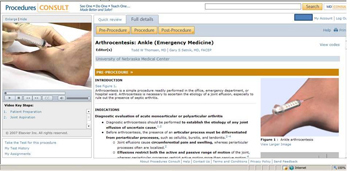 |
UNMC recently purchased rights to the online multimedia resource — Procedures Consult by Elsevier — in January to help students and residents achieve competency in their clinical skills. |
Once the video stopped, it was Derr’s turn to practice a lumbar puncture on a mannequin.
UNMC purchased rights to the online multimedia resource — Procedures Consult by Elsevier — in January to help students and residents achieve competency in their clinical skills.
The software follows the medial creed — “See One. Do One. Teach One.” — and allows students to learn, perform and test their knowledge of internal medicine, anesthesia and emergency medicine procedures through step-by-step videos, animation and text.
“This program is an excellent tool for clinical rotations because it allows you to actually see a procedure prior to being exposed to it in clinic or being asked to perform one yourself,” said Derr, a second-year medical student from Kearney. “It’s exciting to be a part of the direction UNMC is taking in utilizing technology to make exposure to clinical skills more attainable.”
Students and residents can view the program and then perform the procedure on a skills trainer or mannequin.
“This training sequence will improve the clinical procedures skills of our students and residents, which should improve safety and outcomes for our patients,” said Paul Paulman, M.D., assistant dean for clinical skills and quality in the College of Medicine. “We’re moving toward more deliberate clinical procedure teaching and testing.”
|
|
“More deliberate testing will ensure that our graduates are competent in an even broader range of skills so they can be ready for any residency in the country,” Dr. Paulman said.
All faculty and students in the College of Medicine and the School of Allied Health Professions, as well as some residents and select students and faculty members of the College of Nursing, have access to the password-protected program.
“The program is designed for today’s health professional student and is available anywhere students can get the Intranet,” Dr. Paulman said. “It’s short, pertinent and the production values are superb.”
After reviewing a procedure, students have the option to take an online, five-question test and obtain results immediately with feedback on any questions missed.
On the site, students can learn 140 procedures that range from lumbar puncture to inserting a catheter and splinting and casting to wound care. Each procedural section also outlines indications and contraindications, necessary equipment and post-procedure steps.
Students are encouraged to use the program to supplement their academic and clinical studies, Dr. Paulman said. The program will be incorporated into UNMC’s required June term, which gives rising third-year medical students an opportunity to brush up on their clinical skills. It also will be part of the Family Medicine Interest Group’s procedure nights, which enables students to practice their clinical skills in the Michael F. Sorrell Center for Health Science Education’s simulation center.
If a faculty member or student has access problems with Procedures Consult, contact Paul Paulman at ppaulman@unmc.edu.